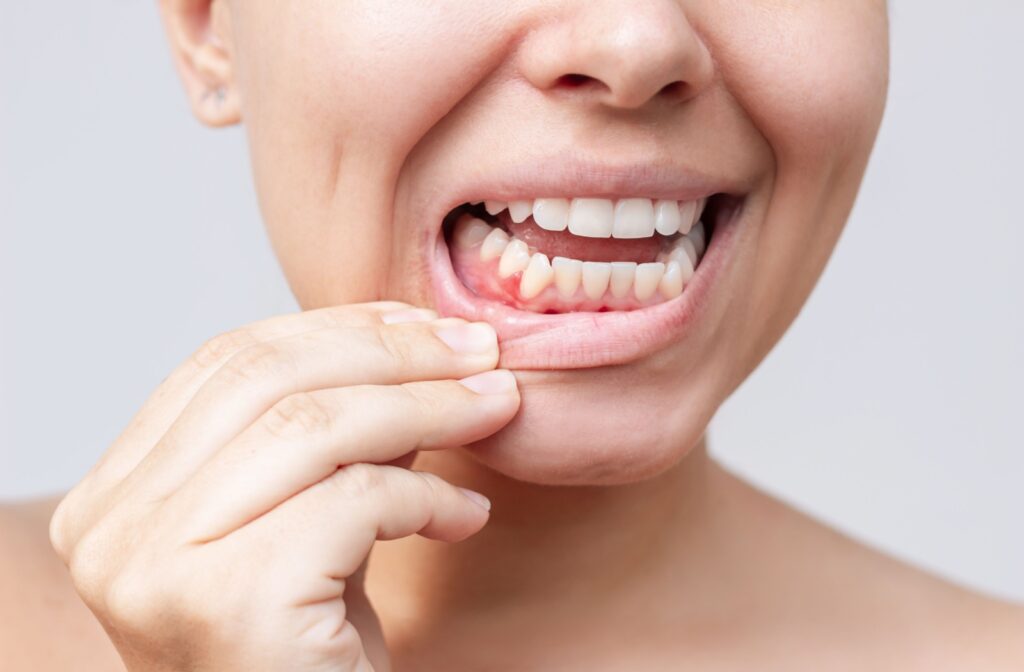In the realm of oral health, few topics stir as much confusion and concern as gum disease. Is it a silent epidemic lurking in our mouths? Can it spread from person to person like the common cold?
These questions often arise, especially when considering the implications for our families and loved ones. Gum disease isn’t “contagious” in the way we think of colds or the flu, but certain types of bacteria linked to it can transfer through saliva.
Causes & Symptoms of Gum Disease
Gum disease, medically known as periodontal disease, is an infection of the tissues that surround and support your teeth. It’s primarily caused by the accumulation of plaque—a sticky film of bacteria—on the surfaces of teeth.
When plaque isn’t removed through regular brushing and flossing, it can harden into tartar, which leads to inflammation and irritation of the gums.
Symptoms of gum disease can range from mild to severe.
- Gingivitis, the earliest stage, manifests as red, swollen gums that bleed easily.
- If left untreated, it can progress to periodontitis, where the gums pull away from the teeth, forming pockets that become infected.
- In severe cases, gum disease can lead to tooth loss and has been linked to other health issues, such as heart disease and diabetes.
Can Gum Disease Be Passed from Person to Person?
A common question people have is whether gum disease is contagious. While gum disease itself is not directly contagious, the bacteria that cause it can be spread through saliva.
This means that if you’re sharing utensils, kissing, or engaging in other activities where saliva is exchanged, there’s a potential for bacteria transfer.
However, simply being exposed to these bacteria does not guarantee the development of gum disease. Various factors, including:
- Personal oral hygiene practices
- Immune system strength
Play a significant role in determining whether a person will develop the disease. Education and awareness about the nature of gum disease and how it spreads can help individuals take preventive measures.
Maintaining good oral hygiene, including brushing twice a day and flossing daily, can help mitigate the risk of developing gum disease, even if exposed to the bacteria.
Who’s Most at Risk for Contracting Gum Disease?
Certain people and groups are more susceptible to developing gum disease. Smokers, for instance, have a significantly higher risk due to the effects of tobacco on gum health.
Smokers often experience reduced blood flow to the gums, impairing healing and increasing susceptibility to infection.
People with diabetes also face an increased risk, as high blood sugar levels can weaken the immune system and hinder the body’s ability to fight off infections. Additionally, older adults may be more vulnerable to gum disease due to age-related changes in oral health.
How to Protect Yourself & Loved Ones from Gum Disease
Preventing gum disease starts with maintaining excellent oral hygiene.
- Brushing your teeth twice daily with fluoride toothpaste
- Flossing daily
- Using an antimicrobial mouthwash
Can significantly reduce plaque buildup and the risk of gum disease. It’s also important to schedule regular dental check-ups. Dentists can provide professional cleanings to remove tartar and early intervention if signs of gum disease appear.
For families, encouraging healthy oral hygiene habits in children from a young age can lay the foundation for a lifetime of healthy gums.
Steps for Preventing the Spread of Gum Disease in Your Home
To minimize the risk of spreading bacteria that cause gum disease, try a few simple practices in your household.
- Encourage everyone to use their own utensils and avoid sharing food or drinks directly.
- Promote regular handwashing and good personal hygiene to further reduce bacterial transmission.
- Educate family members about the importance of oral hygiene and encourage them to follow recommended practices.
Treating Gum Disease: Keeping Your Mouth Healthy
If you or a loved one is diagnosed with gum disease, early treatment is essential.
- Gingivitis, the mildest form, can often be reversed with improved oral hygiene practices. Dentists may also recommend professional cleanings to remove tartar and plaque.
- For more advanced stages, treatments may include scaling and root planing, where plaque and tartar are scraped away from below the gum line.
- In severe cases, surgical interventions may be necessary to restore gum health.
Regular follow-ups with your dentist are crucial for monitoring progress and preventing recurrence.
Talking to Your Dentist About Gum Disease Concerns
Open communication with your dentist is vital for managing gum disease effectively. Don’t hesitate to discuss any concerns or symptoms you may have.
Your dentist can provide valuable insights into your oral health, recommend appropriate treatments, and offer personalized advice on maintaining healthy gums.
If you’re worried about the possible transmission of bacteria within your family, discuss preventive measures with your dentist. They can guide you on best practices tailored to your family’s needs.
If you have any more questions about gum disease and your oral health, book an appointment with Hill Top Dental Centre.



